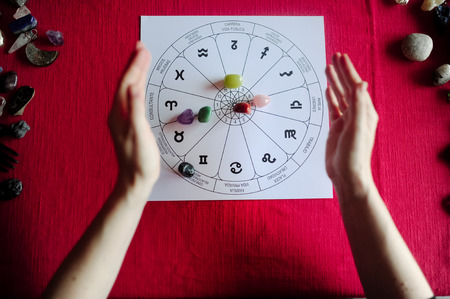Understanding Astrology’s Role in Parenting
In Indian households, astrology is not just a tradition; it is an intrinsic part of daily life and cultural identity. From the moment a child is born, parents often turn to astrologers to cast the newborn’s janam kundali (birth chart), which is believed to offer insights into the child’s personality, strengths, weaknesses, and future prospects. Astrology serves as a guiding force for many Indian parents, helping them make crucial decisions about their child’s education, health, relationships, and even career choices. This deep-rooted belief shapes parenting styles, as mothers and fathers strive to align their nurturing practices with astrological guidance. Consulting astrological charts during important milestones—like naming ceremonies or school admissions—reflects the trust placed in this ancient science. For many families, astrology offers reassurance and a sense of control over uncertainties, blending spiritual wisdom with practical aspects of child-rearing in the Indian context.
2. Interpreting Your Child’s Janam Kundali
For Indian parents, understanding your child’s Janam Kundali (birth chart) is an important step in nurturing their future according to astrological principles deeply rooted in Indian culture. The Janam Kundali is a detailed map of planetary positions at the time of your child’s birth, offering insights into their personality, strengths, challenges, and life path. Proper interpretation can guide you in making well-informed decisions regarding education, career, health, and relationships.
Key Elements of a Janam Kundali
The Janam Kundali consists of several critical components that every parent should be familiar with:
| Term | Description |
|---|---|
| Rashi (Zodiac Sign) | Represents the Moon sign at the time of birth; indicates emotional traits and temperament. |
| Nakshatra (Lunar Mansion) | Divides the zodiac into 27 sectors; each Nakshatra offers unique characteristics and influences behaviour and destiny. |
| Grahas (Planets) | The nine planets (including Sun and Moon) whose positions affect various aspects of life such as intellect, health, and communication. |
| Lagna (Ascendant) | The sign rising on the eastern horizon at birth; shapes physical attributes and overall personality. |
| Bhavas (Houses) | Twelve segments representing different areas of life including family, education, career, and health. |
Reading Your Child’s Birth Chart: Step-by-Step Guidance
- Identify the Rashi: Locate your child’s Moon sign to understand their core nature. For example, a child born under Karka Rashi may be nurturing and sensitive.
- Analyse Nakshatra: Each Nakshatra has its own deity, symbol, and set of traits. Knowing your child’s Nakshatra helps you support their strengths and work on challenges.
- Understand Graha Positions: Observe where key planets like Budh (Mercury) or Shani (Saturn) are placed. Their positions can indicate talents or areas needing extra guidance.
- Lagna Analysis: The Ascendant reveals how your child presents themselves to the world and how they respond to new experiences.
- Examine Bhavas: Each house gives clues about specific domains such as education (4th house), creativity (5th house), or friendships (11th house).
Cultural Context for Indian Parents
In Indian families, consulting a family astrologer or using online Janam Kundali calculators is common practice. It is important to approach these interpretations with an open mind—astrology serves as a tool for self-awareness rather than absolute prediction. Use these insights to nurture your child in alignment with both traditional wisdom and modern aspirations.
![]()
3. Choosing Auspicious Names and Milestones
In Indian culture, astrology plays a significant role in shaping a child’s destiny right from birth. One of the earliest and most meaningful rituals is the Namkaran (naming ceremony). Traditionally, parents consult an astrologer to determine the most favourable letters or syllables for their baby’s name based on the child’s Janam Kundali (birth chart). This ensures that the name chosen aligns with planetary positions, inviting positive energies and blessings into the child’s life.
Astrological Guidance for Important Life Events
Beyond naming, astrology is also central to deciding Shubh Muhurat (auspicious timings) for major milestones such as school admissions, starting new educational journeys, or celebrating birthdays. Parents often seek advice from family priests or astrologers to select dates and times that are believed to bring success, good health, and prosperity. For example, entering a new school during a favourable planetary period is thought to pave the way for academic excellence and personal growth.
The Significance of Shubh Muhurat in Modern Times
While some families follow these traditions rigorously, others may adapt them according to contemporary lifestyles. However, the underlying belief remains that aligning important events with astrologically auspicious moments can have a profound impact on a child’s future. Even today, many Indian parents prefer consulting astrological calendars before making key decisions concerning their children’s education, extra-curricular activities, and even travel plans.
Cultural Considerations and Regional Variations
It’s worth noting that customs related to namkaran and shubh muhurat vary widely across India’s diverse regions. In South India, for instance, the naming ceremony might involve specific mantras and rituals distinct from those in North India. Yet, the core principle of seeking celestial favour through astrology unites families across linguistic and cultural boundaries.
By embracing these time-honoured practices thoughtfully, Indian parents aim not only to uphold tradition but also to nurture their child’s journey with confidence in the stars’ benevolence.
4. Nurturing Strengths and Mitigating Doshas
In Indian astrology, each child’s birth chart (Janam Kundli) reveals unique strengths and challenges. Recognising your child’s innate talents and addressing potential obstacles through astrological guidance can empower parents to support their children more effectively. Here are practical tips rooted in Vedic wisdom for identifying strengths and managing doshas, with a focus on the Indian context.
Identifying Your Child’s Potential Through Astrological Placements
Astrology offers parents a roadmap to their child’s capabilities by analysing planetary positions in their horoscope. For instance:
| Astrological Placement | Potential Strength | Indicative Career/Skill Area |
|---|---|---|
| Strong Mercury (Budh) | Intellectual ability, communication skills | Teaching, writing, public speaking |
| Prominent Jupiter (Guru) | Wisdom, leadership, spirituality | Counselling, law, religious studies |
| Well-placed Mars (Mangal) | Courage, energy, initiative | Sports, defence, engineering |
| Luminous Venus (Shukra) | Creativity, artistic talents | Arts, music, design |
| Strong Sun (Surya) | Confidence, authority, vitality | Leadership roles, politics, administration |
Tip:
Consult a trusted astrologer or use online Kundli analysis tools to discover your child’s planetary strengths. Encourage them in areas where their chart shows natural talent.
Simple Home Remedies and Rituals (Upayas) for Common Doshas
Certain planetary positions may cause doshas—energetic imbalances that can impact a child’s progress or well-being. The most common among Indian families is Mangal Dosh (Manglik), which traditionally affects relationships and overall harmony.
| Common Dosha | Symptoms in Children | Simple Home Upaya/Ritual |
|---|---|---|
| Mangal Dosh (Manglik) | Aggression, impatience, conflicts at home or school | – Offer red lentils (masoor dal) at Hanuman Mandir on Tuesdays – Recite Hanuman Chalisa daily – Wear a copper bracelet after consulting an astrologer |
| Kaal Sarp Dosh | Anxiety, lack of confidence | – Place a silver snake idol under the pillow – Visit Shiva temple on Nag Panchami – Chant “Om Namah Shivaya” mantra 108 times |
| Pitra Dosh | Difficulties in studies or frequent illnesses | – Light a diya under a Peepal tree on Saturdays – Donate food to the needy on Amavasya – Offer water to ancestors with prayers |
Note:
Please consult an experienced astrologer before performing any upayas for accurate diagnosis and personalised remedies. These rituals are culturally significant and widely practised across India for balancing planetary energies.
Cultural Context:
The practice of upayas is deeply embedded in Indian family traditions. Involving children in these simple rituals fosters spiritual grounding and family bonding while addressing astrological concerns practically and positively.
5. Balancing Tradition with Modern Parenting
Integrating Astrology with Contemporary Parenting
In India, astrology has long played a vital role in guiding families through important life decisions, from naming ceremonies to selecting auspicious dates for milestones. However, today’s Indian parents often seek a balanced approach that honours these traditional beliefs while embracing modern parenting philosophies. The challenge lies in harmonising the wisdom of Vedic astrology with the values of independence, creativity, and open-mindedness that define contemporary child-rearing.
Strategies for Harmonious Integration
One effective strategy is to use astrological insights as gentle guidance rather than rigid rules. For instance, while a child’s birth chart (Janam Kundli) might suggest strengths or areas for growth, parents can encourage their children to pursue diverse interests rather than restricting them to predetermined paths. Open communication about astrological traditions can foster respect for family heritage without stifling individual aspirations.
Respecting Family Traditions
Parents can involve elders in sharing stories about how astrology influenced past generations, creating a sense of continuity and cultural pride. Rituals such as performing pujas on significant planetary transits or celebrating birthdays according to the Hindu calendar can be maintained alongside mainstream celebrations, reinforcing a strong connection to roots.
Encouraging Independence and Critical Thinking
It is equally important to nurture critical thinking by discussing astrology as one tool among many for understanding life’s challenges. Encourage children to ask questions and explore their interests freely, using astrological advice as supportive input rather than absolute instruction. This balanced approach helps children grow into confident individuals who appreciate tradition yet feel empowered to shape their own destinies.
6. Consulting a Trusted Astrologer
For many Indian parents, astrology remains an integral part of family decisions and child-rearing traditions. However, with the growing number of astrologers in India, it is vital to ensure that you consult someone who is both reputable and experienced. When seeking astrological guidance for your child’s future, look for astrologers with credible backgrounds—preferably those recommended by friends or family, or affiliated with respected institutions. Always check their qualifications, client reviews, and ethical practices before trusting them with your child’s birth chart.
Understanding the Limits of Astrology
While astrology can offer insights into your child’s personality traits, aptitudes, and potential challenges, it is important to remember that it should not dictate every aspect of their life. Astrology serves as a guide—not a guarantee. Encourage your child to develop their strengths and address weaknesses through hard work and learning, rather than relying solely on astrological predictions.
Maintaining a Balanced Perspective
Striking a balance between tradition and modern parenting is essential. Use astrological advice as one of several tools for nurturing your child’s growth. Combine it with open communication, supportive education, and positive encouragement. This approach respects cultural values while empowering your child to make informed choices for themselves.
Empowering Your Child’s Journey
Ultimately, consulting a trusted astrologer can provide reassurance and direction for Indian parents, but it should complement—not overshadow—the love, support, and opportunities you provide for your child. By blending astrological wisdom with practical parenting strategies, you help create a strong foundation for your child’s successful future.

